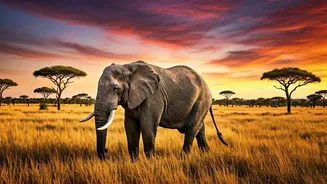Choosing Your Safari
Selecting the right African safari is the first crucial step towards an incredible experience. This choice should be made while taking your budget, time,
and travel preferences into consideration. Consider if you prefer a luxury lodge experience, a more rustic camping adventure, or a combination of both. Think about the types of animals you most want to see, such as the 'Big Five' (lion, leopard, elephant, rhino, and buffalo). Different regions offer unique wildlife concentrations. Tanzania, for instance, is famous for the Great Migration in the Serengeti, offering a once-in-a-lifetime opportunity. Kenya is also great with its iconic Masai Mara National Reserve. South Africa provides a diverse range of safari experiences, including self-drive options, while Botswana offers an exclusive, high-end safari experience. Consider the time of year and the associated weather conditions to optimize your animal sightings and ensure a comfortable journey. Furthermore, think about what activities you want to participate in. Do you prefer game drives, walking safaris, or perhaps even hot air balloon rides over the savanna? Planning the right safari involves balancing personal desires with practicality and budget to ensure a fulfilling and unforgettable trip.
Best Times to Go
The ideal time to go on an African safari depends heavily on the specific region you want to visit and what you want to experience. Generally, the dry season (June to October) is considered the peak safari season. During this time, animals congregate around water sources, making them easier to spot. The vegetation is also less dense, improving visibility. In East Africa, the Great Migration in the Serengeti and Masai Mara typically occurs during these months, offering the spectacular sight of millions of wildebeest and zebra crossing the Mara River. In Southern Africa, the dry season also provides optimal conditions for wildlife viewing in countries like Botswana and Zambia. However, it is also the busiest and most expensive time to travel, with higher costs for accommodation and tours. The shoulder seasons (April-May and November) offer a balance of good wildlife viewing with fewer crowds and lower prices. The weather during these months can be unpredictable, with occasional showers, but this often adds to the beauty of the landscape. The wet season (November to May), while less popular, can also offer unique advantages. You will witness the birth of young animals, lush vegetation, and fewer tourists. However, some roads may be impassable, and wildlife may be more dispersed. Overall, the best time to go will depend on your priorities, budget, and desired experiences.
Safari Planning Tips
Careful planning is crucial for a smooth and enjoyable African safari. Booking your safari well in advance is essential, especially if you plan to travel during peak season. Popular accommodations and tours fill up quickly. Consider travel insurance that covers medical emergencies, trip cancellations, and lost luggage. Make sure you have the necessary vaccinations and malaria medication. Consult with your doctor to determine which vaccinations are recommended for the regions you plan to visit. Pack the right gear. Include lightweight, neutral-colored clothing, sturdy walking shoes, a hat, sunglasses, and sunscreen. A good pair of binoculars and a camera with a long zoom lens are also essential for wildlife viewing. Respect the wildlife and their habitats. Always follow the instructions of your guides and maintain a safe distance from animals. Choose tour operators carefully. Research reputable companies with experienced guides. This ensures safety, a better wildlife viewing experience, and support for conservation efforts. Finally, be prepared for some inconveniences. Power outages, bumpy roads, and changes in plans are all part of the adventure. Embrace the unexpected and remain flexible; this will enhance your enjoyment of the safari.
Safari Destination Choices
Africa boasts diverse landscapes and unique wildlife encounters. Tanzania is world-renowned for the Serengeti and the Ngorongoro Crater, offering unparalleled opportunities to witness the Great Migration and the 'Big Five'. Kenya's Masai Mara is another prime location for the Great Migration and offers incredible wildlife viewing, with the chance to see lions, cheetahs, and other predators. Botswana's Okavango Delta provides a unique safari experience, allowing you to explore the waterways by mokoro (traditional dugout canoe) and witness a variety of birdlife and wildlife. South Africa is popular due to its accessibility and diverse offerings, including the Kruger National Park, which is home to a vast array of wildlife. Zimbabwe and Zambia offer exciting safari experiences. Zimbabwe's Hwange National Park and Zambia's South Luangwa National Park present exceptional opportunities to spot wildlife. Uganda and Rwanda are popular for gorilla trekking, with opportunities to trek through dense forests. Choosing the right destination depends on your wildlife preferences, budget, and desired experiences, offering unforgettable African safaris.





















